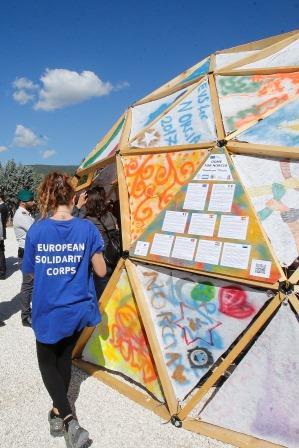Erasmus+
Erasmus+ is the EU's programme to support education, training, youth and sport in Europe.
Erasmus+ helps people of all ages and backgrounds develop and share knowledge and experience at institutions and organisations in different countries. It enhances skills and intercultural awareness and helps people become engaged citizens.
In 2019, 11,319 participants in 250 Irish projects benefited from mobility in higher education, vocational education and training, school education, adult learning and youth for a total grant amount of € 21.09 million.
The 2021-2027 Erasmus+ programme places a strong focus on social inclusion, the green and digital transitions, and promoting young people’s participation in democratic life. It has an estimated budget of €26.2 billion. This is nearly double the funding compared to its predecessor programme (2014-2020).
In Ireland, the Erasmus+ programme is managed by Léargas.

European Solidarity Corps
The European Solidarity Corps provides funding and support to young people aged between 18 and 30 who are looking for an opportunity to take part in projects that benefit communities, either abroad or in their own country.
European Solidarity Corps funding is provided in the form of grants to organisations through calls for proposals.
Young people wishing to engage in such activities need to register in the European Solidarity Corps portal. The European Solidarity Corps portal offers a place for those young people and organisations, holding a grant, to implement activities and to find each other.

Traineeships at the European Commission
There are two five-month traineeship sessions at the European Commission – one which begins in March and the second which begins in October. To apply for either session, you have to plan in advance, as closing dates are at the end of the previous August for the March session and at the end of January for the October session. EU citizens and non-EU citizens can apply and successful trainees will receive a monthly allowance. Applicants must be graduates and must have a very good knowledge of two EU languages (non-EU citizens must only have one).
Note: at the European Commission, it is also possible to apply for a translation traineeship for example or for a scientific traineeship (Joint Research Centre).
Learning corner
If you're a primary or secondary school pupil, this is where you’ll find games, competitions and activity books to help you discover the EU in a fun way, in the classroom or at home. You can also find out more about studying or volunteering abroad.
If you're a teacher and want to help your pupils learn about the EU and how it works, this is a source of teaching material for all age groups. As well as finding inspiration for lesson plans, you can also discover networking opportunities with other schools and teachers across the EU.
